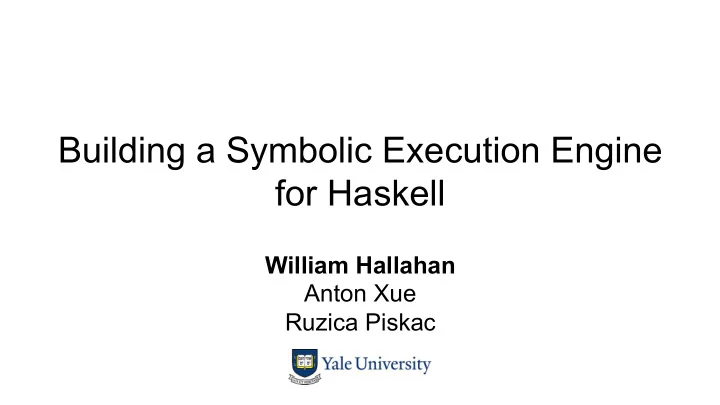

Building a Symbolic Execution Engine for Haskell William Hallahan Anton Xue Ruzica Piskac
Functional languages - why? ● A different way of problem solving ○ Pattern matching, Higher Order Functions, Algebraic Data Types … ● Functional languages allow for easier equational reasoning ○ Objects are described by what they are rather than how they are constructed ● Strong static type system catches many errors at compile time ○ Many safeguards (e.g. null pointer checks) can be encoded as types
Extraction from source code ● Use Glasgow Haskell Compiler API to extract Core Haskell from source ○ GHC Pipeline: Source → AST → Core Haskell → … Full Language AST Core Haskell Traceable from Source Yes Somewhat Concise Representation No Yes Easily Manipulatable No Yes ● Further translate Core Haskell to custom language (G2 Core) ○ Close one-to-one representation of Core Haskell ○ Simplifies and discards extraneous data present in Core Haskell annotations
Execution ● General functional language: run reductions until a normal form is reached ● Challenge : symbolic execution requires symbolic variables ○ Augment Haskell lazy evaluation semantics with reduction rules for symbolic variables ○ Semantics: Making a Fast Curry: Push/Enter vs Eval/Apply ... [SPJ, SM 2004] ● Approach : treat symbolic execution as a bounded model-checking problem ○ Implement reduce function that applies augmented reduction execution rules one at a time ○ Apply reduction rules repeatedly to perform execution ■ Regular Haskell: apply until normal form is reached ■ Symbolic execution: apply until normal form is reached or we hit a counter limit
Constraint solving ● Most basic feature of symbolic execution is reachability testing ○ Can convert many problems such as assertion violation into state reachability problems ● Constraint solving: interface with SMT solver ○ Convert path constraints from execution to SMT-LIB2 files ■ SMT-LIB2 format supports all the constructs necessary ● Equivalents for primitives such as Int, Float, Rational, etc ● Can declare new algebraic data types ○ Run a SMT solver on these files
Recommend
More recommend